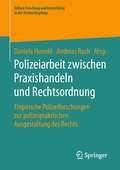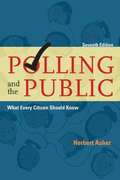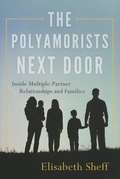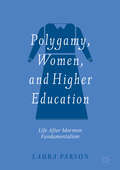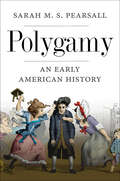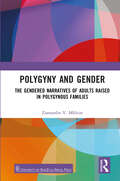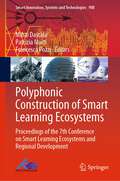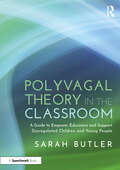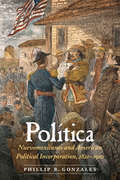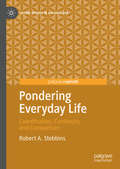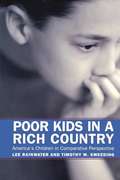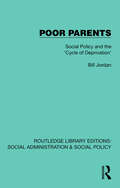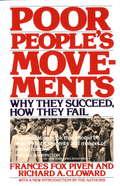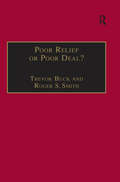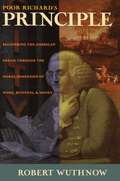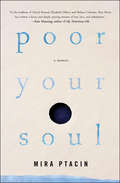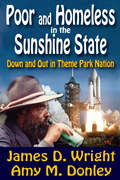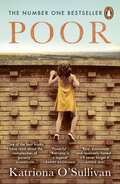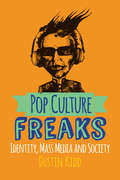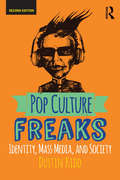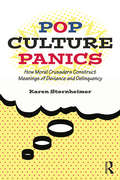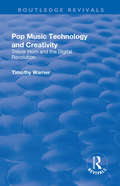- Table View
- List View
Polizei und Gesellschaft: Transdisziplinäre Perspektiven zu Methoden, Theorie und Empirie reflexiver Polizeiforschung
by Christiane Howe Lars OstermeierDarstellungen der Polizei in der Polizeiforschung gleichen häufig den Schilderungen der sprichwörtlichen blinden Männer, die einen Elefanten untersuchen und dabei jeweils etwas völlig Unterschiedliches beschreiben. Eine dominierende und leitende Fragestellung dabei ist meist, ob sich die empirischen Ergebnisse mit als ideal definierten Vorstellungen von der Polizei decken oder nicht. Für die sich hier auftuende Kluft werden dann jeweils Erklärungen gesucht. Die Beiträge in diesem Band gehen darüber hinaus und positionieren sich zwischen etablierten Positionen, die „für“, „über“ oder „gegen“ die Polizei forschen. Aus theoretisch wie methodisch unterschiedlichen Perspektiven wird thematisiert, wie Erkenntnis in der Polizeiforschung durch den sozialen und je eigenen wissenschaftlichen Kontext geprägt und in ihm verankert ist.
Polizeiarbeit zwischen Praxishandeln und Rechtsordnung: Empirische Polizeiforschungen zur polizeipraktischen Ausgestaltung des Rechts (Edition Forschung und Entwicklung in der Strafrechtspflege)
by Daniela Hunold Andreas RuchDer vorliegende Band vereint aktuelle, interdisziplinäre Forschungen, welche sich im Kern mit dem Handeln der Polizei als soziales Phänomen beschäftigen. In diesem Zusammenhang greifen die Autoren/innen auch Fragen nach den rechtlichen Rahmenbedingungen polizeilichen Handelns sowie Einflüssen polizeilicher Praktiken auf Ausgestaltungen des Rechts auf. Ziel des Buches ist es, einen breiten Überblick über die hiesige, im Vergleich zu anderen Ländern immer noch recht rudimentär aufgestellte Polizeiforschung zu geben. Die Zusammenstellung praxisorientierter Perspektiven verfolgt dabei auch den Zweck, einen Baustein für eine Theorie der Praxis der Polizei zu liefern.
Polling and Public Opinion
by Peter Marshall ButlerThe importance of polling public opinion is widely recognized today. Indeed, it is sometimes argued that in mass societies, polls have also become an important medium for communicating ideas and beliefs, especially since many people have become less involved in community organizations and interest groups that formerly connected them to events and issues. Polling and Public Opinion examines the impact that polls have on the thoughts and behaviour of the public.Peter M. Butler considers the power of public opinion polls as an element of mass persuasion in media stories, advertising, and government policy. Using such controversial issues as free trade, health care, same-sex marriage, and national security, Butler argues that popular opinion on such hot-button topics as these can be guided and changed according to how polls are interpreted for and presented to the public. As well as analyzing the impact of polls on the public, Butler is concerned with demystifying the methods by which opinions are collected, showing that the techniques used to determine public opinion can be just as selective as those by which the results are disseminated.Focusing on many of the vital topics of our time, Polling and Public Opinion is an in-depth look at the rise of one of the most important but least understood methods by which politicians and governments gauge the popular will.
Polling and the Public: What Every Citizen Should Know (7th edition)
by Herbert AsherHow many of our answers to pollsters' questions are pure lies? Why do election predictions go terribly wrong? Asher (political science emeritus, Ohio State U.) updates his classic with new research and current events as he helps undergraduates and general readers understand what polls are, how they work, and what they do. He closely describes, with examples, the complicated relationship between the public and the polls, the problem with instability and a lack of opinion, the tricks of the trade in developing and arranging questions, sampling techniques and pitfalls, interviewing and data collection procedures, the ways in which the media uses polls, and the impact of polls on elections and democracy. One of the best chapters covers how to analyze and interpret polls. Each chapter includes exercises and Asher contributes web sites and references. Annotation ©2007 Book News, Inc., Portland, OR (book news. com)
Polyamorists Next Door: Inside Multiple-partner Relationships and Families
by Elisabeth SheffPolyamorous families are families in which people are free to pursue emotional, romantic, and sexual relationships with multiple people at the same time, openly and with support from their partners, sometimes forming multi-partner relationships or other arrangements that allow for emotional and sexual freedom within the family system. In colorful and moving details, this book explores how polyamorous relationships come to be, grow and change, manage the ins and outs of daily family life, and cope with the challenges polyamorists face both within their families and from society at large. Using polyamorists' own words, Dr. Elisabeth Sheff examines polyamorous households and reveals their advantages, disadvantages, and the daily lives of those living in them. Elisabeth Sheff PhD, is an educational and legal consultant who specializes in the families of sexual and gender minorities. She is the CEO and director of legal services at the Sheff Consulting Group in Atlanta, a think tank of experts specializing in unconventional and underserved populations. One of the foremost experts on polyamory and polyamorous families with children, she has presented her work at national and international conferences and has lectured widely on the topic.
Polygamy, Women, and Higher Education: Life After Mormon Fundamentalism
by Laura ParsonThis volume explores the life stories of women who were former members of Mormon fundamentalist polygamous societies, from their own perspectives, to seek insight into their readiness for higher education settings. In order to support all learners in higher education, it is important to understand the unique needs of women students who have non-traditional formal schooling experiences and/or have come from restrictive or patriarchal cultures. This book helps further the discourse by providing recommendations for inclusive programs that consider how to develop elements of self-concept, empowerment, and motivation necessary for higher education success—academically and beyond.
Polygamy: An Early American History (Very Short Introduction Ser.)
by M. S. PearsallA groundbreaking examination of polygamy showing that monogamy was not the only form marriage took in early America"A richly sourced, elegantly written, and strikingly original interdisciplinary study of the diverse practices of polygamy in American from ca.1500 to 1900.&”—John Witte Jr., Journal of Law and ReligionToday we tend to think of polygamy as an unnatural marital arrangement characteristic of fringe sects or uncivilized peoples. Historian Sarah Pearsall shows us that polygamy&’s surprising history encompasses numerous colonies, indigenous communities, and segments of the American nation. Polygamy—as well as the fight against it—illuminates many touchstones of American history: the Pueblo Revolt and other uprisings against the Spanish; Catholic missions in New France; New England settlements and King Philip&’s War; the entrenchment of African slavery in the Chesapeake; the Atlantic Enlightenment; the American Revolution; missions and settlement in the West; and the rise of Mormonism.Pearsall expertly opens up broader questions about monogamy&’s emergence as the only marital option, tracing the impact of colonial events on property, theology, feminism, imperialism, and the regulation of sexuality. She shows that heterosexual monogamy was never the only model of marriage in North America.
Polygyny and Gender: The Gendered Narratives of Adults Raised in Polygynous Families
by Zamambo V. MkhizeThe people of Africa have contrasting perspectives on gender, feminism, and the family from their Western counterparts. Similarly, social structures like, religion, capitalism and the law require a context-specific application to polygyny. This book examines the construction of gender identity in adults raised in Zulu polygynous families in the Hammarsdale area in KwaZulu-Natal, South Africa. It highlights the complexities of gender identities as participants negotiate between modern, constitutional, and individual freedoms and patriarchal, cultural, and communal customs and traditions. The themes also point towards the argument between individuality and collectivism in the creation of gender identity within polygynous families in Zulu culture. The South African Constitution guarantees gender equality and individual rights and freedoms for its citizens, yet customary law practices, like polygyny, appear to contravene these principles. The participants reveal that although women and men experience different consequences, they cite similar prevalent factors like gender role socialisation, naming practices and the doctrine of seniority, influencing their gender identity construction. Print edition not for sale in Sub Saharan Africa.
Polyphonic Construction of Smart Learning Ecosystems: Proceedings of the 7th Conference on Smart Learning Ecosystems and Regional Development (Smart Innovation, Systems and Technologies #908)
by Patrizia Marti Mihai Dascalu Francesca PozziThe book brings together the contributions of the 7th International Conference on Smart Learning Ecosystems and Regional Development (SLERD 2022), which aims at promoting reflection and discussion concerning R&D work, policies, case studies, and entrepreneur experiences with a special focus on understanding the relevance of smart learning ecosystems (e.g., schools, campus, working places, informal learning contexts, etc.) for regional development and social innovation and how the effectiveness of the relation of citizens and smart ecosystems can be boosted. This forum has a special interest in understanding how technology mediated instruments can foster the citizen’s engagement with learning ecosystems and territories, namely by understanding innovative human-centric design and development models/techniques, education/training practices, informal social learning, innovative citizen-driven policies, technology mediated experiences, and their impact. This set of concerns will contribute to foster the social innovation sectors and ICT and economic development and deployment strategies alongside new policies for smarter proactive citizens.
Polyvagal Theory in the Classroom: A Guide to Empower Educators and Support Dysregulated Children and Young People
by Sarah ButlerPolyvagal Theory provides a breakdown of how the nervous system responds and reacts to unconscious messages of safety and threat. This accessible guide explores Polyvagal Theory and its potential for fully understanding and supporting the behaviours of children and young people in emotional distress at school.By exploring how early childhood experiences - such as abuse, trauma, an insecure attachment, or bereavement - can have a detrimental impact on the development of the child’s nervous system, we can view their behaviours in a new light. Polyvagal Theory in the Classroom: - Contains a wealth of activities to use in the classroom- Delves into new understandings of what is happening to children and young people when they become dysregulated- Introduces practical ways to support pupils' emotional wellbeing, promote better mental health, and help to develop their capacity to self-regulate- Contains exercises which provide opportunities for the reader to reflect on their own practice.Packed full of case studies to bring theory to life, this book builds skills to gain awareness and control of our own nervous systems and to become the safe and calm presence for the overwhelmed child. This empowering book is essential reading for mainstream primary and secondary teachers, SENCOs and teaching support staff.
Política: Nuevomexicanos and American Political Incorporation, 1821–1910
by Phillip B. GonzalesPolítica offers a stunning revisionist understanding of the early political incorporation of Mexican-origin peoples into the U.S. body politic in the nineteenth century. Historical sociologist Phillip B. Gonzales reexamines the fundamental issue in New Mexico’s history, namely, the dramatic shift in national identities initiated by Nuevomexicanos when their province became ruled by the United States. Gonzales provides an insightful, rigorous, and controversial interpretation of how Nuevomexicano political competition was woven into the Democratic and Republican two-party system that emerged in the United States between the 1850s and 1912, when New Mexico became a state. Drawing on newly discovered archival and primary sources, he explores how Nuevomexicanos relied on a long tradition of political engagement and a preexisting republican disposition and practice to elaborate a dual-party political system mirroring the contours of U.S. national politics.Política is a tour de force of political history in the nineteenth-century U.S.–Mexico borderlands that reinterprets colonization, reconstructs Euro-American and Nuevomexicano relations, and recasts the prevailing historical narrative of territorial expansion and incorporation in North American imperial history. Gonzales provides critical insights into several discrete historical processes, such as U.S. racialization and citizenship, integration and marginalization, accommodation and resistance, internal colonialism, and the long struggle for political inclusion in the borderlands, shedding light on debates taking place today over Latinos and U.S. citizenship.
Pondering Everyday Life: Coordination, Continuity, and Comparison (Leisure Studies in a Global Era)
by Robert A. StebbinsThis pivot provides a conceptual statement of an approach to understanding the interrelationships of work, leisure, and “chore” activities in daily life, and how they are managed in practice. Drawing on the sociology of everyday life, Stebbins puts forward the notion of Pondering Everyday Life (PEA), a thinking process/activity in which we routinely understand, coordinate, organize, remember, and compare our involvements in work, leisure, and non-work obligations. This perspective demonstrates how the interrelation between these three domains helps bring meaning and continuity to everyday life. As a micro- and meso-level conception that takes into account social, cultural and historic context, Stebbins contemplates how and what PEA can tell us about an individual’s view of their own life. Pondering Everyday Life will be of interest to students and scholars across leisure studies, social psychology, and the sociology of leisure and work.
Ponzi Schemes in the Caribbean
by Catherine Pattillo Ana Carvajal Hunter Monroe Brian WynterA report from the International Monetary Fund.
Poor Kids In A Rich Country: America's Children In Comparative Perspective
by Lee Rainwater Timothy M. SmeedingIn comparing the situation of American children in low-income families with their counterparts in other wealthy countries, Lee Rainwater and Timothy M. Smeeding provide a powerful perspective on the dynamics of child poverty in the United States.
Poor Parents: Social Policy and the 'Cycle of Deprivation' (Routledge Library Editions: Social Administration & Social Policy)
by Bill JordanOriginally published in 1974, this book provides a critique of official policy towards families with young children living on low incomes and looks in detail at some of the myths prevalent in the public debate – both political and academic – about the ‘cycle of deprivation’, a phrase coined by Sir Keith Joseph (British Politician, 1918-1994). One of these myths is that it is possible to provide, on a selective basis, the best services for the poorest members of the community. Anthe is that the poorest group is the one which is in most need of every kind of social service. A third is that the more generous provision of social services to areas with high concentrations of poor families can reduce tensions and conflicts between social groups. The author contends that these myths are being used to obscure the fact that the persistent force behind post-war social policy is none other than the spirit of the Poor Law.
Poor People's Movements
by Frances Fox Piven Richard ClowardHave the poor fared best by participating in conventional electoral politics or by engaging in mass defiance and disruption? The authors of the classic Regulating The Poor assess the successes and failures of these two strategies as they examine, in this provocative study, four protest movements of lower-class groups in 20th century America:-- The mobilization of the unemployed during the Great Depression that gave rise to the Workers' Alliance of America-- The industrial strikes that resulted in the formation of the CIO-- The Southern Civil Rights Movement-- The movement of welfare recipients led by the National Welfare Rights Organization.From the Trade Paperback edition.
Poor Relief or Poor Deal?: The Social Fund, Safety Nets and Social Security (Studies in Cash & Care)
by Trevor BuckThe social fund has been a controversial instrument of social policy in the UK since its introduction in 1988. This book brings together new research and debate on the role and effect of the social fund in relieving poverty, and introduces evidence from the wider European field to allow comparison to be made with other countries' experience of providing a 'safety net' for their poorest citizens. This book opens up for wider discussion the question of how to provide help for disadvantaged groups and individuals at times of financial crisis. Addressing practical questions about how such schemes work (or fail to work) effectively, the book also provides the basis for more general consideration of the overall objectives which they are expected to meet. This will contribute to new thinking about the policy goals of the social fund and other emergency payment schemes, and their role in meeting broader aspirations such as cohesion, inclusion and social justice.
Poor Richard's Principle: Recovering the American Dream through the Moral Dimension of Work, Business, and Money
by Robert WuthnowThe American Dream is in serious danger, according to Robert Wuthnow--not because of economic conditions, but because its moral underpinnings have been forgotten. In the past this vision was not simply a formula for success, but a moral perspective that framed our thinking about work and money in terms of broader commitments to family, community, and humanitarian values. Nowadays, we are working harder than ever, and yet many of us feel that we are not realizing our higher aspirations as individuals or as a people. Here Wuthnow examines the struggles in which American families are now engaged as they try to balance work and family, confront the pressures of consumerism, and find meaning in their careers. He suggests that we can find economic instruction and inspiration in the nation's past--in such figures as Benjamin Franklin, for instance, who was at once the prudent Poor Richard, the engaged public person, and the enthusiastic lover of life. Drawing on first-hand accounts from scores of people in all walks of life and from a national survey, the book shows that work and money cannot be understood in terms of economic theories alone, but are inevitably rooted in our concepts of ourselves and in the symbolic rituals and taboos of everyday life. By examining these implicit cultural understandings of work and money, the book provides a foundation for bringing moral reasoning more fully to bear on economic decisions. It re-examines the moral arguments that were prominent earlier in our history, shows how these arguments were set aside with the development of economistic thinking, and suggests their continuing relevance in the lives of people who have effectively resisted the pressures of greater financial commitments. Demonstrating that most Americans do bring values implicitly to bear on their economic decisions, the book shows how some people are learning to do this more effectively and, in the process, gain greater control over their work and finances. At a time when policymakers are raising questions about the very survival of the American dream, Poor Richard's Principle offers an analysis of how moral restraint can once again play a more prominent role in guiding our thinking.
Poor Your Soul: A Memoir
by Mira PtacinPoor Your Soul--moving, wise, and passionately written--is a beautiful reflection on sexuality, free will, and the fierce bonds of family.At twenty-eight, Mira Ptacin discovered she was pregnant. Though it was unplanned, she embraced the idea of starting a family and became engaged to Andrew, the father. Five months later, an ultrasound revealed that her child would be born with a constellation of birth defects and no chance of survival outside the womb. Mira was given three options: terminate the pregnancy, induce early delivery, or wait and inevitably miscarry.Mira's story is paired with that of her mother, who emigrated from Poland to the United States, and who also experienced grievous loss when her only son was killed by a drunk driver. These deftly interwoven stories offer a picture of mother and daughter finding strength in themselves and each other in the face of tragedy.From the Hardcover edition.family, human sexuality, and free will.From the Hardcover edition.
Poor and Homeless in the Sunshine State: Down and Out in Theme Park Nation
by James WrightA place like Orlando, Florida is not transformed from swampland to sprawling metropolis through Peter Pan-like flights of fancy, but through theme park expansions requiring developmental schemes that are tough minded and often worsen relationships between the wealthy and the poor. The homeless arrive with their own hopes and illusions, which are soon shattered. The rest of the local population makes its peace with the system. Meanwhile the homeless are reduced to advocacy models that neither middle- nor working-class folks much worry about. They are modern members of Ellison's "invisible men" but they comprise a racial and social mixture unlike any other in the American landscape.This book is primarily about the dark side of this portrait the poor, near-poor, homeless, and dispossessed who live in the midst of this verdant landscape. The phrase "down and out," has been used to describe people who are destitute or penniless since the late nineteenth century. Here the term is used in a more expansive sense, as synonymous with anyone who lives near, at, or over the edge of financial catastrophe.
Poor: Grit, courage, and the life-changing value of self-belief
by Katriona O'SullivanThe No. 1 BestsellerBiography of the Year, Irish Book Awards 2023The Last Word Listeners' Choice Award, Irish Book Awards 2023'One of the best [books] I have read about the complexities of poverty . . . one of the most remarkable people you will ever meet' GuardianLike young girls everywhere Katriona O’Sullivan grew up bright, enthusiastic, curious. But she was also surrounded by abject poverty and chaos, and after she became pregnant and homeless at 15, what followed was five years of barely surviving. Yet today Katriona is an award-winning academic whose work explores barriers to education for girls like her.What set Katriona on this unexpected path were the mentors and supporters who truly saw her. The teachers who showed her how to wash in the school toilets or turned up at her door to convince her to sit at least one GCSE. The community worker who encouraged her to apply for training schemes. The friend who introduced Katriona to Trinity College’s access program while she was a cleaner. Simple acts that would help her turn her life around.Told with warmth, clarity and compassion – compassion for her parents, for her younger self, for others – Poor is both an astonishing personal testimony and an impassioned plea for the future of our children.‘Powerful – Katriona is a legend’ Barry Keoghan‘Raw, passionate and resolutely honest – I’ll never forget it’ Annie Mac'Full of insight . . . so important' Fi Glover, Times Radio 'I read poor in one sitting I found it so compelling . . . moving, uplifting, brave, heroic' Nuala McGovern, Woman's Hour, BBC Radio Four'Moving, funny, brave and original - just like the author . . . absolutely incredible' Roísín Ingle, Irish Times Women's Podcast‘One of the books of the year’ Patrick Kielty, Late Late Show, RTÉ One'One of the most important books I have ever read … a beautiful telling of determination despite the odds' Lynn Ruane, Irish Times 'Fearless, funny and searingly honest' Adil Ray OBE'Raw and remarkable' Irish Independent 'A book of empowerment and hope' Patricia Scanlan‘Remarkable . . . a vivid retelling of Katriona flourishing, despite her beginnings’ BBC News West MidlandsNumber 1 bestseller, Irish Times, March 2024
Pop Culture Freaks
by Dustin KiddLove it or hate it, popular culture permeates every aspect of contemporary society. In this accessibly written introduction to the sociology of popular culture, Dustin Kidd provides the tools to think critically about the cultural soup served daily by film, television, music, print media, and the internet. Utilizing each chapter to present core topical and timely examples, Kidd highlights the tension between inclusion and individuality that lies beneath mass media and commercial culture, using this tension as a point of entry to an otherwise expansive topic. He systematically considers several dimensions of identity-race, class, gender, sexuality, disability-to provide a broad overview of the field that encompasses classical and contemporary theory, original data, topical and timely examples, and a strong pedagogical focus on methods. Pop Culture Freaks encourages students to develop further research questions and projects from the material. Both quantitative and qualitative analyses are brought to bear in Kidd's examination of the labor force for cultural production, the representations of identity in cultural objects, and the surprising differences in how various audiences consume and use mass culture in their everyday lives.
Pop Culture Freaks: Identity, Mass Media, and Society
by Dustin KiddUtilizing each chapter to present core topical and timely examples, Pop Culture Freaks highlights the tension between inclusion and individuality that lies beneath mass media and commercial culture, using this tension as a point of entry to an otherwise expansive topic. He systematically considers several dimensions of identity—race, class, gender, sexuality, disability—to provide a broad overview of the field that encompasses classical and contemporary theory, original data, topical and timely examples, and a strong pedagogical focus on methods. Pop Culture Freaks encourages students to develop further research questions and projects from the material. Both quantitative and qualitative analyses are brought to bear in Kidd's examination of the labor force for cultural production, the representations of identity in cultural objects, and the surprising differences in how various audiences consume and use mass culture in their everyday lives. This new, revised edition includes update examples and date to reflect a constantly changing pop culture landscape.
Pop Culture Panics: How Moral Crusaders Construct Meanings of Deviance and Delinquency
by Karen SternheimerMoral panics reveal much about a society’s social structure and the sociology embedded in everyday life. This short text examines extreme reactions to American popular culture over the past century, including crusades against comic books, music, and pinball machines, to help convey the "sociological imagination" to undergraduates. Sternheimer creates a critical lens through which to view current and future attempts of modern-day moral crusaders, who try to convince us that simple solutions—like regulating popular culture—are the answer to complex social problems. Pop Culture Panics is ideal for use in undergraduate social problems, social deviance, and popular culture courses.
Pop Music: Technology and Creativity - Trevor Horn and the Digital Revolution (Ashgate Popular And Folk Music Ser.)
by Timothy WarnerThis title was first published in 2003.This highly original and accessible book draws on the author’s personal experience as a musician, producer and teacher of popular music to discuss the ways in which audio technology and musical creativity in pop music are inextricably bound together. This relationship, the book argues, is exemplified by the work of Trevor Horn, who is widely acknowledged as the most important, innovative and successful British pop record producer of the early 1980s. In the first part of the book, Timothy Warner presents a definition of pop as distinct from rock music, and goes on to consider the ways technological developments, such as the transition from analogue to digital, transform working practices and, as a result, impact on the creative process of producing pop.

